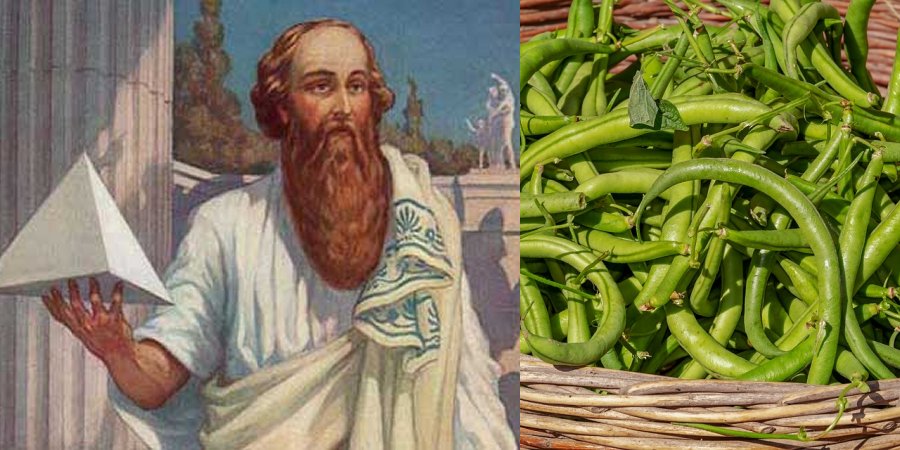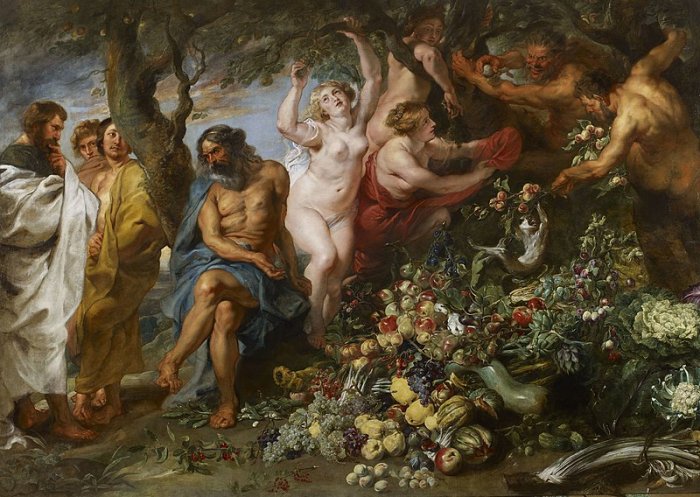Why Didn’t Pythagoras And His Followers Eat Beans?
Conny Waters - AncientPages.com - Pythagoras of Samos, an ancient Greek philosopher who made great contributions to mathematics and founded the Pythagorean School of Mathematics in Cortona, a Greek seaport in Southern Italy, was a vegetarian.
But did you know that Pythagoras abstained from meat and beans? Most vegetarians consume beans, but Pythagoras told his followers they mustn’t eat or even touch beans! Was Pythagoras worried about gastric problems, or did he have a deeper reason for omitting beans from the diet?
Left: Pythagoras. Credit: Famous Mathematicians. Right: Beans. Credit: Public Domain
The reason behind this is not entirely known, but there are certain theories that can provide some light on the great philosopher’s reluctance to beans.
Pythagoras believed that a person should strive for tranquility and peace. Beans were associated with metempsychosis, a philosophical term in the Greek language referring to the transmigration of the soul, especially its reincarnation after death. Pythagoreans believed that beans had the potential for life because they looked like human genitalia or fetuses.
Pythagoras conducted a scientific experiment demonstrating that humans and beans were spawned from the same source. He took some beans and buried them in the mud. They rested there for a few weeks before being removed and investigated by the great Greek philosopher. He concluded they looked like human fetuses.
Like ancient Egyptians, Greeks knew that fava beans could be deadly. Pliny wrote that followers of Pythagoras believed that fava beans were connected to Hades, the Greek God of the Dead, and the Underworld. The plants’ black-spotted flowers and hollow stems served as ladders for human souls and were associated with reincarnation.
Aristotle suggested that the bulbous shape of beans represented the entire universe, which was why beans shouldn’t be consumed.
Cicero proposed another explanation. In his book On Divination, he just wrote that he believed the Pythagoreans didn’t eat beans because they caused flatulence.
Pythagoras advocating vegetarianism. Painting made between 1618 and 1630. Credit: Public Domain
Another theory is that Pythagoras may not have had anything against beans at all. However, beans were used in ancient Greece as a ballot system. White beans represented a yes vote and black a no.
When Pythagoras said to his disciples, "Abstain from beans," he had no reference to them as an article of diet, for he ate them himself, but he advised his students not to get caught up in politics or government.
As H. L. Sumner points out, “what he did mean, and what his immediate followers already understood, was that they should abstain from the intrigues of politics as being antagonistic to a philosopher's pursuits.”
To put it in plain text – We do know that Pythagoras had disapproved of beans, but we simply don’t know what was behind his negative attitude.
Updated on November 24, 2023
Written by Conny Waters – AncientPages.com Staff Writer
Copyright © AncientPages.com All rights reserved. This material may not be published, broadcast, rewritten or redistributed in whole or part without the express written permission of AncientPages.com
Expand for referencesMore From Ancient Pages
-
 Decoding The Mysterious Medieval Pearl Manuscript
Linguistic Discoveries | Mar 26, 2025
Decoding The Mysterious Medieval Pearl Manuscript
Linguistic Discoveries | Mar 26, 2025 -
 Unexpected Discovery Of Viking Trading Place In Norway Re-Writes History
Archaeology | Jul 22, 2020
Unexpected Discovery Of Viking Trading Place In Norway Re-Writes History
Archaeology | Jul 22, 2020 -
 Science Unravels Some Secrets Of Mysterious Shipwreck Gribshunden
Archaeology | Sep 17, 2022
Science Unravels Some Secrets Of Mysterious Shipwreck Gribshunden
Archaeology | Sep 17, 2022 -
 Mystery Of The Patagonian Giants: Europe’s Lost Race From The ‘Land Of The Bigfeet’
Featured Stories | Jun 20, 2020
Mystery Of The Patagonian Giants: Europe’s Lost Race From The ‘Land Of The Bigfeet’
Featured Stories | Jun 20, 2020 -
 Ancient Egyptian Blue Used To Create New Nanomaterial 100,000 Times Thinner Than A Human Hair
Ancient Technology | Mar 24, 2020
Ancient Egyptian Blue Used To Create New Nanomaterial 100,000 Times Thinner Than A Human Hair
Ancient Technology | Mar 24, 2020 -
 Mysterious Ancient Star People Of The Secret Power
Ancient Mysteries | Sep 12, 2018
Mysterious Ancient Star People Of The Secret Power
Ancient Mysteries | Sep 12, 2018 -
 Deciphered Ancient Cuneiform Tablets Reveal Locations Of Long-Lost Cities And Shed Light On The Secrets Of Mesopotamia
Places | Oct 20, 2024
Deciphered Ancient Cuneiform Tablets Reveal Locations Of Long-Lost Cities And Shed Light On The Secrets Of Mesopotamia
Places | Oct 20, 2024 -
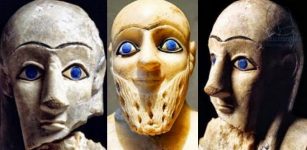 Mysterious Sumerian Statues With Big Blue Eyes – A Sign From The Gods
Civilizations | Feb 23, 2017
Mysterious Sumerian Statues With Big Blue Eyes – A Sign From The Gods
Civilizations | Feb 23, 2017 -
 Mysterious Ancient Stone Structures Discovered In Illinois Remain Unexplained – Archaeologists Say
Featured Stories | May 26, 2024
Mysterious Ancient Stone Structures Discovered In Illinois Remain Unexplained – Archaeologists Say
Featured Stories | May 26, 2024 -
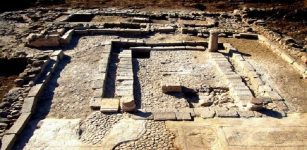 2,000-Year-Old Ruins In Mary Magdalene’s Town Of Magdala On The Shore Of The Sea Of Galilee
Biblical Mysteries | Dec 26, 2014
2,000-Year-Old Ruins In Mary Magdalene’s Town Of Magdala On The Shore Of The Sea Of Galilee
Biblical Mysteries | Dec 26, 2014 -
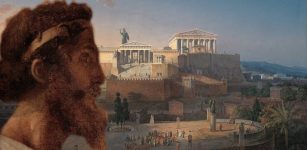 Popular Tyrant Peisistratos Tricked The Athenians To Seize Power And People Loved Him
Featured Stories | Jan 12, 2021
Popular Tyrant Peisistratos Tricked The Athenians To Seize Power And People Loved Him
Featured Stories | Jan 12, 2021 -
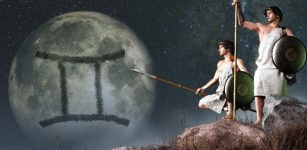 Castor And Pollux: Dioscuri Brothers Immortalized In The Night Sky In Greek Beliefs
Featured Stories | Jan 24, 2024
Castor And Pollux: Dioscuri Brothers Immortalized In The Night Sky In Greek Beliefs
Featured Stories | Jan 24, 2024 -
 Fire Reveals Notre-Dame De Paris Cathedral Was Historical First In Using Iron Reinforcements In The 12th Century
Archaeology | Mar 17, 2023
Fire Reveals Notre-Dame De Paris Cathedral Was Historical First In Using Iron Reinforcements In The 12th Century
Archaeology | Mar 17, 2023 -
 Remnants Of A Royal Rest House That Served As A Temporary Residence For Pharaoh Thutmose III
Archaeology | May 9, 2024
Remnants Of A Royal Rest House That Served As A Temporary Residence For Pharaoh Thutmose III
Archaeology | May 9, 2024 -
 Napoleonic Code: Why Was One Of The Most Influential Civil Codes Flawed?
Ancient History Facts | May 16, 2020
Napoleonic Code: Why Was One Of The Most Influential Civil Codes Flawed?
Ancient History Facts | May 16, 2020 -
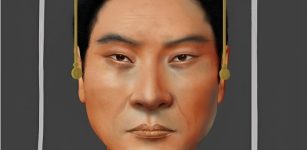 Facial Reconstruction Of Chinese Emperor Wu Who Lived 1,500 Years Ago
DNA | Mar 29, 2024
Facial Reconstruction Of Chinese Emperor Wu Who Lived 1,500 Years Ago
DNA | Mar 29, 2024 -
 Mysterious Denisovans – New Study Offers New Evidence
Fossils | Mar 25, 2021
Mysterious Denisovans – New Study Offers New Evidence
Fossils | Mar 25, 2021 -
 Ancient Romans Used The Poisonous Black Henbane Plant As Hallucinogenic Medicine
Archaeology | Feb 9, 2024
Ancient Romans Used The Poisonous Black Henbane Plant As Hallucinogenic Medicine
Archaeology | Feb 9, 2024 -
 Quest For The Magical Healing Flower In The Garden Of Bakavali Led To A Love Story
Featured Stories | May 28, 2019
Quest For The Magical Healing Flower In The Garden Of Bakavali Led To A Love Story
Featured Stories | May 28, 2019 -
 Evidence Of Advanced Military Robots In The Ancient World – Unknown High-Tech Examined
Ancient Mysteries | Jan 13, 2021
Evidence Of Advanced Military Robots In The Ancient World – Unknown High-Tech Examined
Ancient Mysteries | Jan 13, 2021

